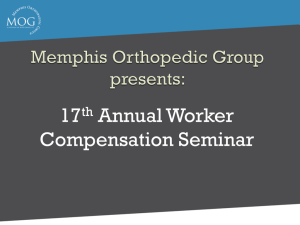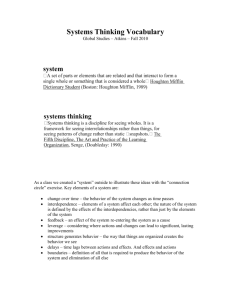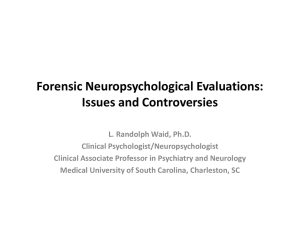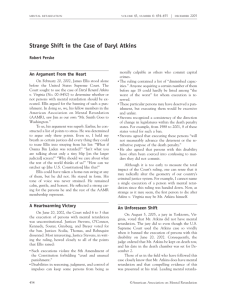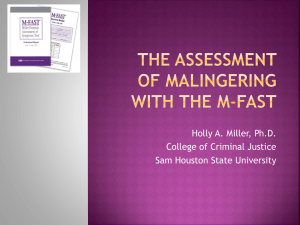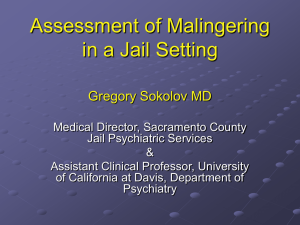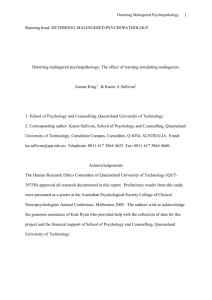handout - American College of Forensic Psychology
advertisement
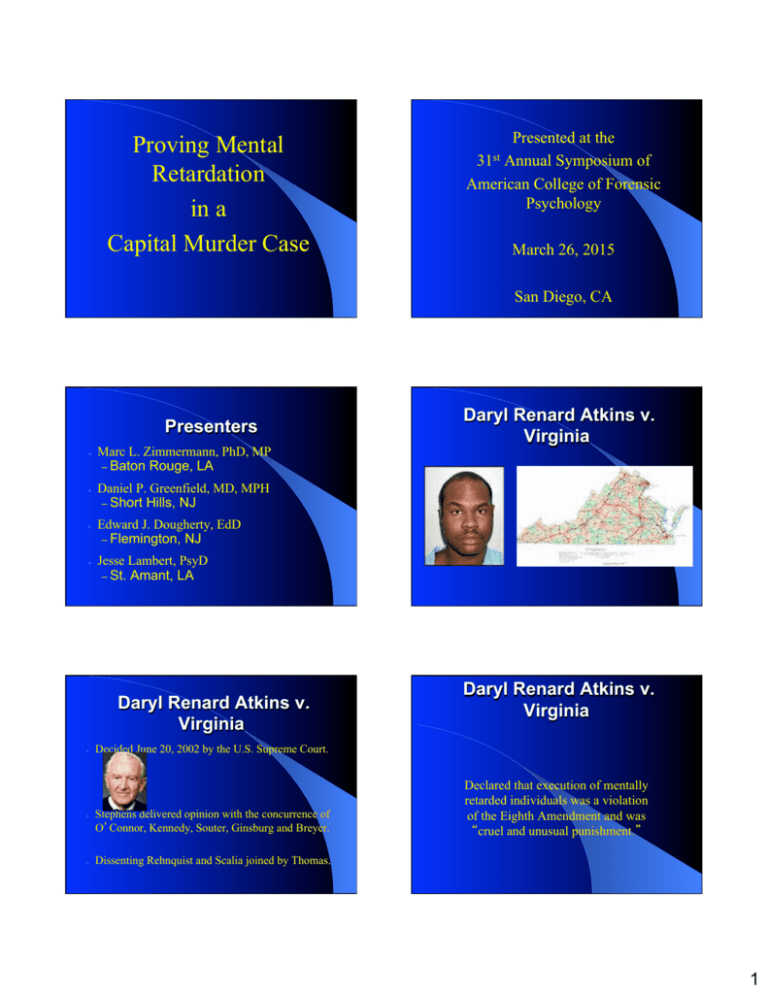
Proving Mental Retardation in a Capital Murder Case Presented at the 31st Annual Symposium of American College of Forensic Psychology March 26, 2015 San Diego, CA Presenters ● ● ● ● Marc L. Zimmermann, PhD, MP – Baton Rouge, LA Daniel P. Greenfield, MD, MPH – Short Hills, NJ Edward J. Dougherty, EdD – Flemington, NJ Jesse Lambert, PsyD – St. Amant, LA Daryl Renard Atkins v. Virginia ● ● ● Daryl Renard Atkins v. Virginia Daryl Renard Atkins v. Virginia Decided June 20, 2002 by the U.S. Supreme Court. Stephens delivered opinion with the concurrence of O’Connor, Kennedy, Souter, Ginsburg and Breyer. Declared that execution of mentally retarded individuals was a violation of the Eighth Amendment and was “cruel and unusual punishment.” Dissenting Rehnquist and Scalia joined by Thomas. 1 Atkins v Virginia • Clinical definitions of mental retardation require not only subaverage intellectual functioning, but also significant limitations in adaptive skills. Atkins V Virginia Mentally retarded persons frequently know the difference between right and wrong and are competent to stand trial, • Atkins v Virginia • But by definition, they have diminished capacities to understand and process information, to communicate, to abstract from mistakes and learn from experience, to engage in logical reasoning, to control impulses, and to understand others' reactions. Their deficiencies do not warrant an exemption from criminal sanctions, but diminish their personal culpability. Atkins v Virginia ● ● ● ● ● Atkins v Virginia ● DSM IV Definition of mental retardation – An ● I.Q. of 70 or less 5 points is allowed for standard error of measurement (75). – Deficits ● – Onset Atkins V Virginia ● • in two areas of adaptive functioning Communication, self-care, home living, social/ interpersonal skills, use of community resources, self direction, functional academic skills, work, leisure, health, and safety. prior to age 18 Decided using: WAIS III AAMR (Now AAIDD) Mental Retardation: Definition, Classification, and Systems of Supports 5 (9th ed. 1992) Diagnostic and Statistical Manual of Mental Disorders (4th ed. 2000) Other scholarly works. • States were encouraged to set their own standards. “As was our approach in Ford v. Wainwright, 477 U. S. 399 (1986), with regard to insanity, we leave to the State[s] the task of developing appropriate ways to enforce the constitutional restriction upon [their] execution of sentences.” 2 Atkins v Virginia • Atkins v Virginia “. . . a basis for the death penalty applies to mentally retarded offenders. Gregg v. Georgia, 428 U. S. 153, 183 (1976) ( joint opinion of Stewart, Powell, and Stevens, JJ.), identified “retribution and deterrence of capital crimes by prospective offenders” as the social purposes served by the death penalty. Unless the imposition of the death penalty on a mentally retarded person “measurably contributes to one or both of these goals, it is nothing more than the purposeless and needless imposition of pain and suffering,’ and hence an unconstitutional punishment.” • ● In Justice Scalia’s dissent, he noted: “Determination of a person’s incapacity is a matter of great difficulty, partly from the easiness of counterfeiting this disability . . . and partly from the variety of the degrees of this infirmity, whereof some are sufficient, and some are insufficient to excuse persons in capital offenses. . . .” Atkins v Virginia Atkins v. Virginia Rehquest’s dissent indicated : “I agree with JUSTICE SCALIA, post, at 1 (dissenting opinion), . . . I write separately, however, to call attention to the defects in the Court.s decision to place weight on foreign laws, the views of professional and religious organizations, and opinion polls in reaching its conclusion.” ● ● ● While MR/ID is a three prong test, We are going to focus on the first prong, documenting an accurate IQ score in the appropriate range for the diagnosis. Prong two, demonstrating deficits in adaptive functioning will be in another presentation. Freddie Lee Hall v. Florida Freddie Lee Hall v. Florida • ● ● Decided May 27, 2014 5-4. Kennedy delivered the opinion of the Court, in which Ginsburg, Breyer, Sotomayor, and Kagan joined. There is no bright-line IQ cutoff. SEM must be considered. 3 Hall v Florida ● Alito, filed a dissenting opinion, in which Roberts, Scalia and Thomas, joined. Freddie Lee Hall While the Florida legislature passed a law that would allow for SEM, the courts did not use this but interpreted the law too narrowly. Mental Retardation/ Intellectual Disability Atkins vs. Virginia ● How do you know when an IQ score is accurate, i.e. a true measure of IQ? DSM 5 ● ● ● Mental Retardation has become Intellectual Disability in DSM 5 Still Mental Retardation in ICD 10 Atkins v Virginia definition (DSM-III) – An IQ of approximately 75 or less. – Deficits – Onset of Adaptive Functioning. prior to age 18. Which Diagnostic Criteria should I use ? B) DSM III DSM IV C) DSM 5 D) ICD 10 E) None of the above A) Diagnostic criteria are essentially the same but much more poorly worded (editorial comment) 4 LA Criminal Code of Procedure Diagnostic Criteria Courts have their own diagnostic criteria. These come from: Legislation Court opinions Chase v Mississippi ● ● ● ● 905.5.1 H.(1) "Mental retardation" means a disability characterized by significant limitations in both intellectual functioning and adaptive behavior as expressed in conceptual, social, and practical adaptive skills. The onset must occur before the age of eighteen years. Malingering ...a Full Scale IQ score of 75 or lower. ...on the second prong, deficiencies in adaptive functioning Essentially the same criteria in DSM from DSM III (1980) to present. Malingering Malingering is not considered a mental illness. (DSM-5), malingering is a conditions that may be a focus of clinical attention. "The essential feature of Malingering is the intentional production of false or grossly exaggerated physical or psychological symptoms, motivated by external incentives such as avoiding military duty, avoiding work, obtaining financial compensation, evading criminal prosecution, or obtaining drugs." Malingering Factitious Disorder? IV DSM 5 ICD 10 DSM 5 Malingering • Malingering There are no tests of malingering normed on mentally retarded/intellectually disabled individuals. • • How many malingerers were used in norming tests of malingering? Malingering ● Is someone simulating malingering the same as a malingerer? Malingering ● ● Malingering The above being true, how does one prove mental retardation (IQ)? Is someone simulating depression the same as someone who is depressed? Is someone simulating schizophrenia the same as someone who is schizophrenic? Malingering ● ● Dr. Albert J. Kastl ● ● ● Since malingering/effort tests are not normed for MR/ID, If real malingerers are not used in norming the malingering tests, Will two of these tests yield better results than one? . . how about three? What about false positives? 6 Malingering ● ● Can one malinger and still be retarded/ disabled? Can one malinger or exaggerate on one test and not another (even given at the same setting)? Testing 101 ● To be useful a test must have – Reliability – Validity - it measures what it states it measures Testing 101 ● The first IQ test was created by Alfred Binet and his student Theodore Simon and was published in 1908 and again in 1911. Testing 101 Theodore Simon Testing 101 ● Lewis Terman adapted the Binet Simon scales as the Stanford Binet in 1916. – it measures consistently Testing 101 The Wechsler series began in 1939 with the Wechsler Bellevue Scale by David Wechsler. 7 Testing 101 ● ● We are now on the cusp of Wechsler Adult Intelligence Scale 5. All of these Intellectual ability tests have built on top of the others and have been accepted because of reliability and validity based on the previous measures. Testing 101 Psychometricians generally regard IQ tests as having high statistical reliability. A high reliability implies that—although testtakers may have varying scores when taking the same test on differing occasions, and they may have varying scores when taking different IQ tests at the same age—the scores generally agree with one another and across time. ● Testing 101 ● Like all statistical quantities, any particular estimate of IQ has an associated standard error that measures uncertainty about the estimate. Testing 101 • Testing 101 Testing 101 Standard Error of measurement Standard Error of measurement A statistical estimate of the amount of random error in the assessment of results or scores. A test is reliable if it consistently measures a characteristic, allowing for statistical errors such as; the Tree Stump Effect of the WAIS III or Flynn Effect Non-technical definition Stolen from Texas Education Agency, 2003 The simplest, most non-technical way to think of the standard error of measurement is the following: If a single student were to take the same test repeatedly (with no new learning taking place between testings and no memory of question effects), the standard deviation of his or her repeated test scores is denoted as the standard error of measurement. 8 Testing 101 Testing 101 ● Reliability "Yielding the same or compatible results in different clinical experiments or statistical trials" In normal language, we use the word “reliable” to mean that something is dependable and that it will give the same outcome every time. ● ● ● If malingering/effort tests are not appropriate for assessing mental retarded/intellectual disabled persons If one can malinger on one test and not on another given at the same testing period If Dr. Kastl is right (which he always is), how do we assess for malingering? How can one get an accurate measure of IQ? Testing 101 Example Instrument FSIQ % Year Date Administered Released Years Since Normed Summary Flynn Effect Adjusted % Score (.3 X years since normed) WISC-R 68 2 1993 1974 20 6 62 1 WAIS-R* 60 1 1998 1981 18 5 55* 1 WAIS-R* 73 4 1998 1981 18 5 68* 2 WAIS-III 63 1 2005 1997 9 3 60 1 KAIT 65 1 2005 1993 12 4 61 1 Mean * Tree Stump 66 1.8 Assessment of IQ is objective. Consider malingering. Criteria vary from state to state. Death (execution) is the same. Bogus application of psychological science for legal purposes. 61 * 2.34 9
